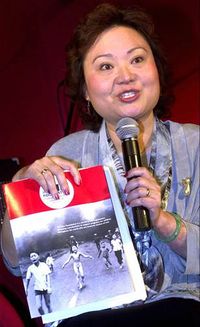Kim Phuc: Difference between revisions
No edit summary |
No edit summary |
||
| (2 intermediate revisions by 2 users not shown) | |||
| Line 1: | Line 1: | ||
{{AAType | {{AAType | ||
|Image=120601-Kim-Phuc-vmed-1130a.grid-4x2.jpg | |Image=120601-Kim-Phuc-vmed-1130a.grid-4x2.jpg | ||
|Home page=http://www.kimfoundation.com | |Home page=http://www.kimfoundation.com | ||
|Location= | |Location=Ontario | ||
|Type=Person | |Type=Person | ||
|Arts=Documentary, Media Arts, Politics, Politics and Law, Activist | |||
}} | }} | ||
Kim Phuc is a Vietnamese-Canadian best known as the child depicted in the Pulitzer Prize-winning photograph taken during the Vietnam War on June 8, 1972. The iconic photo taken in Trang Bang by AP photographer Nick Ut shows her at about nine years of age running naked on a road after being severely burned on her back by a South Vietnamese napalm attack. | Kim Phuc is a Vietnamese-Canadian best known as the child depicted in the Pulitzer Prize-winning photograph taken during the Vietnam War on June 8, 1972. The iconic photo taken in Trang Bang by AP photographer Nick Ut shows her at about nine years of age running naked on a road after being severely burned on her back by a South Vietnamese napalm attack. | ||
| Line 13: | Line 13: | ||
In 1997 she established the first Kim Phuc Foundation in the US, with the aim of providing medical and psychological assistance to child victims of war. | In 1997 she established the first Kim Phuc Foundation in the US, with the aim of providing medical and psychological assistance to child victims of war. | ||
On December 28, 2009, National Public Radio broadcast her spoken essay, "The Long Road to Forgiveness," for the "This I Believe" series. In May 2010, Phúc was reunited by the BBC with ITN correspondent Christopher Wain, who helped to save her life. On May 18, 2010, Phúc appeared on the BBC Radio 4 programme It's my Story. In the programme, Phúc related how she was involved through her foundation in the efforts to secure medical treatment in Canada for Ali Abbas, who had lost both arms in a rocket attack on Baghdad during the invasion of Iraq in 2003. | On December 28, 2009, National Public Radio broadcast her spoken essay, "The Long Road to Forgiveness," for the "This I Believe" series. In May 2010, Phúc was reunited by the BBC with ITN correspondent Christopher Wain, who helped to save her life. On May 18, 2010, Phúc appeared on the BBC Radio 4 programme It's my Story. In the programme, Phúc related how she was involved through her foundation in the efforts to secure medical treatment in Canada for Ali Abbas, who had lost both arms in a rocket attack on Baghdad during the invasion of Iraq in 2003. | ||
{{From http://en.wikipedia.org/wiki/Phan_Thi_Kim_Phuc}} | {{From|http://en.wikipedia.org/wiki/Phan_Thi_Kim_Phuc}} | ||
Latest revision as of 23:07, 8 November 2012
Ontario 50° 0' 2.44" N, 86° 0' 3.52" W Documentary Media Arts Politics Politics and Law Activist Person
Kim Phuc is a Vietnamese-Canadian best known as the child depicted in the Pulitzer Prize-winning photograph taken during the Vietnam War on June 8, 1972. The iconic photo taken in Trang Bang by AP photographer Nick Ut shows her at about nine years of age running naked on a road after being severely burned on her back by a South Vietnamese napalm attack.
As a young adult, while studying medicine, Phúc was removed from her university and used as a propaganda symbol by the communist government of Vietnam. In 1986, however, she was granted permission to continue her studies in Cuba. She had converted from her family's Cao Dai religion to Christianity four years earlier.Phạm Văn Đồng, the then–Prime Minister of Vietnam, became her friend and patron.
After arriving in Cuba, she met Bui Huy Toan, another Vietnamese student and her future fiancé. In 1992, Phúc and Toan married and went on their honeymoon in Moscow. During a refuelling stop in Gander, Newfoundland, they left the plane and asked for political asylum in Canada, which was granted. The couple now lives in Ajax, Ontario, and have two children. In 1996, Phúc met the surgeons who had saved her life. The following year, she passed the Canadian Citizenship Test with a perfect score and became a Canadian citizen.
In 1997 she established the first Kim Phuc Foundation in the US, with the aim of providing medical and psychological assistance to child victims of war.
On December 28, 2009, National Public Radio broadcast her spoken essay, "The Long Road to Forgiveness," for the "This I Believe" series. In May 2010, Phúc was reunited by the BBC with ITN correspondent Christopher Wain, who helped to save her life. On May 18, 2010, Phúc appeared on the BBC Radio 4 programme It's my Story. In the programme, Phúc related how she was involved through her foundation in the efforts to secure medical treatment in Canada for Ali Abbas, who had lost both arms in a rocket attack on Baghdad during the invasion of Iraq in 2003.
